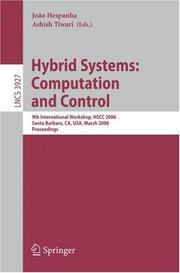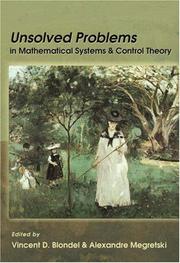| Listing 1 - 10 of 10 |
Sort by
|
Book
ISBN: 0691179573 9780691179575 Year: 2018 Publisher: Princeton: Princeton University Press,
Abstract | Keywords | Export | Availability | Bookmark
 Loading...
Loading...Choose an application
- Reference Manager
- EndNote
- RefWorks (Direct export to RefWorks)
Digital
ISBN: 9783540331711 Year: 2006 Publisher: Berlin Heidelberg Springer-Verlag GmbH
Abstract | Keywords | Export | Availability | Bookmark
 Loading...
Loading...Choose an application
- Reference Manager
- EndNote
- RefWorks (Direct export to RefWorks)
Computer science --- Computer architecture. Operating systems --- Artificial intelligence. Robotics. Simulation. Graphics --- Computer. Automation --- vormgeving --- informatica --- simulaties --- programmeren (informatica) --- software engineering --- KI (kunstmatige intelligentie) --- architectuur (informatica) --- AI (artificiële intelligentie)
Book
ISBN: 9781400885442 Year: 2017 Publisher: Princeton, NJ
Abstract | Keywords | Export | Availability | Bookmark
 Loading...
Loading...Choose an application
- Reference Manager
- EndNote
- RefWorks (Direct export to RefWorks)
Book
ISBN: 9780691175218 Year: 2017 Publisher: Princeton : Princeton University Press,
Abstract | Keywords | Export | Availability | Bookmark
 Loading...
Loading...Choose an application
- Reference Manager
- EndNote
- RefWorks (Direct export to RefWorks)
Noncooperative Game Theory is aimed at students interested in using game theory as a design methodology for solving problems in engineering and computer science. João Hespanha shows that such design challenges can be analyzed through game theoretical perspectives that help to pinpoint each problem's essence : Who are the players? What are their goals? Will the solution to "the game" solve the original design problem ? Using the fundamentals of game theory, Hespanha explores these issues and more. The use of game theory in technology design is a recent development arising from the intrinsic limitations of classical optimization-based designs. In optimization, one attempts to find values for parameters that minimize suitably defined criteria-such as monetary cost, energy consumption, or heat generated. However, in most engineering applications, there is always some uncertainty as to how the selected parameters will affect the final objective. Through a sequential and easy-to-understand discussion, Hespanha examines how to make sure that the selection leads to acceptable performance, even in the presence of uncertainty-the unforgiving variable that can wreck engineering designs. Hespanha looks at such standard topics as zero-sum, non-zero-sum, and dynamics games and includes a MATLAB guide to coding. Noncooperative Game Theory offers students a fresh way of approaching engineering and computer science applications. (-) An introduction to game theory applications for students of engineering and computer science (-) Materials presented sequentially and in an easy-to-understand fashion (-) Topics explore zero-sum, non-zero-sum, and dynamics games (-) MATLAB commands are included.
Noncooperative games (Mathematics) --- Game theory --- Cooperative games (Mathematics)
Book
Year: 2017 Publisher: Princeton, NJ : Princeton University Press,
Abstract | Keywords | Export | Availability | Bookmark
 Loading...
Loading...Choose an application
- Reference Manager
- EndNote
- RefWorks (Direct export to RefWorks)
Noncooperative Game Theory is aimed at students interested in using game theory as a design methodology for solving problems in engineering and computer science. João Hespanha shows that such design challenges can be analyzed through game theoretical perspectives that help to pinpoint each problem's essence: Who are the players? What are their goals? Will the solution to "the game" solve the original design problem? Using the fundamentals of game theory, Hespanha explores these issues and more.The use of game theory in technology design is a recent development arising from the intrinsic limitations of classical optimization-based designs. In optimization, one attempts to find values for parameters that minimize suitably defined criteria-such as monetary cost, energy consumption, or heat generated. However, in most engineering applications, there is always some uncertainty as to how the selected parameters will affect the final objective. Through a sequential and easy-to-understand discussion, Hespanha examines how to make sure that the selection leads to acceptable performance, even in the presence of uncertainty-the unforgiving variable that can wreck engineering designs. Hespanha looks at such standard topics as zero-sum, non-zero-sum, and dynamics games and includes a MATLAB guide to coding.Noncooperative Game Theory offers students a fresh way of approaching engineering and computer science applications.An introduction to game theory applications for students of engineering and computer science Materials presented sequentially and in an easy-to-understand fashionTopics explore zero-sum, non-zero-sum, and dynamics gamesMATLAB commands are included
Noncooperative games (Mathematics) --- Game theory --- Cooperative games (Mathematics) --- MATLAB. --- Minimax Theorem. --- N-player game. --- Nash equilibrium. --- Separating Hyperplane Theorem. --- Sudoku puzzle. --- action space. --- action. --- admissible Nash equilibrium. --- advertising campaign. --- alternate play. --- average security level. --- battle of the sexes. --- behavioral policy. --- behavioral saddle-point equilibrium. --- best-response equivalent games. --- bilateral symmetric game. --- bimatrix game. --- bimatrix potential. --- chicken game. --- circuit design. --- completely mixed Nash equilibrium. --- computational complexity. --- computer science. --- congestion game. --- continuous time cost-to-go. --- continuous time differential. --- continuous time dynamic programming. --- continuous time dynamic. --- convex analysis. --- convex hull. --- decoupled game. --- design methodology. --- differential game. --- discrete time cost-to-go. --- discrete time dynamic programming. --- discrete time dynamic. --- distributed resource allocation. --- dummy game. --- dynamic game. --- engineering. --- extensive form game representation. --- feedback game. --- fictitious play. --- finite one-player. --- game theory. --- graphical method. --- hyperplane. --- identical interests. --- information structure. --- linear program. --- linear quadratic dynamic. --- minimum. --- mixed Nash equilibrium. --- mixed action space. --- mixed policy. --- mixed saddle-point equilibrium. --- mixed security policy. --- multi-stage game. --- network routing. --- non-feedback game. --- non-zero-sum. --- noncooperative game theory. --- open-loop policy. --- open-loop. --- optimization-based design. --- order interchangeability property. --- policy. --- potential game. --- probability distribution. --- pure N-player game. --- pure policy. --- recursive computation. --- regret. --- robust design. --- rock-paper-scissors. --- rope-pulling. --- saddle-point equilibrium. --- security level. --- security policy. --- simultaneous play. --- single-stage game. --- state feedback information structure. --- state-feedback policy. --- stochastic policy. --- strictly dominating policy. --- symmetry game. --- tic-tac-toe. --- tree structure. --- uncertainty. --- variable termination time. --- war of attrition. --- weakly dominating policy. --- zebra in the lake. --- zero sum dynamic. --- zero-sum matrix. --- zero-sum two-person. --- zero-sum.
Digital
ISBN: 9781400885442 9780691175218 Year: 2017 Publisher: Princeton, N.J. Princeton University Press
Abstract | Keywords | Export | Availability | Bookmark
 Loading...
Loading...Choose an application
- Reference Manager
- EndNote
- RefWorks (Direct export to RefWorks)

ISSN: 03029743 ISBN: 3540331700 9783540331704 3540331719 Year: 2006 Volume: 3927 Publisher: Berlin New York : Springer,
Abstract | Keywords | Export | Availability | Bookmark
 Loading...
Loading...Choose an application
- Reference Manager
- EndNote
- RefWorks (Direct export to RefWorks)
Hybrid computers --- Calculateurs hybrides --- Congresses. --- Congrès --- Digital control systems --- Computer Science --- Electrical Engineering --- Engineering & Applied Sciences --- Electrical & Computer Engineering --- Congrès --- EPUB-LIV-FT SPRINGER-B --- Computer science. --- Microprocessors. --- Special purpose computers. --- Software engineering. --- Computers. --- Computer logic. --- Computer Science. --- Theory of Computation. --- Special Purpose and Application-Based Systems. --- Processor Architectures. --- Logics and Meanings of Programs. --- Software Engineering. --- Computation by Abstract Devices. --- Computer science logic --- Logic, Symbolic and mathematical --- Automatic computers --- Automatic data processors --- Computer hardware --- Computing machines (Computers) --- Electronic brains --- Electronic calculating-machines --- Electronic computers --- Hardware, Computer --- Computer systems --- Cybernetics --- Machine theory --- Calculators --- Cyberspace --- Computer software engineering --- Engineering --- Special purpose computers --- Computers --- Minicomputers --- Informatics --- Science --- Automatic control --- Electronic digital computers --- Information theory. --- Logic design. --- Design, Logic --- Design of logic systems --- Digital electronics --- Electronic circuit design --- Logic circuits --- Switching theory --- Communication theory --- Communication --- Hybrid computers - Congresses. --- Digital control systems - Congresses. --- Computers, Special purpose. --- Computer architecture. --- Computer Science Logic and Foundations of Programming. --- Architecture, Computer
Book
ISBN: 9783540331711 Year: 2006 Publisher: Berlin Heidelberg Springer Berlin Heidelberg
Abstract | Keywords | Export | Availability | Bookmark
 Loading...
Loading...Choose an application
- Reference Manager
- EndNote
- RefWorks (Direct export to RefWorks)
This volume contains the proceedings of the 9th Workshop on Hybrid S- tems:ComputationandControl(HSCC 2006)heldinSantaBarbara,California, during March 29-31, 2006. The annual workshop on hybrid systems attracts researchers from academia and industry interested in modeling, analysis, and implementation of dynamic and reactive systems involving both discrete and continuous behaviors. The previous workshops in the HSCC series were held in Berkeley, USA (1998), Nijmegen, The Netherlands (1999), Pittsburgh, USA (2000), Rome, Italy (2001), Palo Alto, USA (2002), Prague, Czech Republic (2003), Philadelphia, USA (2004), and Zurich, Switzerland (2005). This year's HSCC was organized in cooperation with the Special Interest Group on Emb- ded Systems (SIGBED) of ACM. The program consisted of 3 invited talks and 39 regular papers selected from 79 regular submissions. The program covered topics such as tools for analysis and veri?cation, control and optimization, modeling, engineering applications, andemergingdirectionsinprogramminglanguagessupportandimplementation. We would like to thank the Program Committee members and reviewers for an excellent job of evaluating the submissions and participating in the online ProgramCommitteediscussions.Specialthanksalsogoto FrancescoBullo(U- versity of California at Santa Barbara), P. R. Kumar (University of Illinois at Urbana-Champaign), and John Rushby (SRI International) for their partici- tionas invitedspeakers.We arealsogratefulto the Steering Committee for their helpful guidance and support. Many other people worked hard to make HSCC 2006a successandweacknowledgetheir help. Wewouldliketo expressourgr- itude to the US National Science Foundation, SRI International, and University of California at Santa Barbara for their ?nancial support.
Computer science --- Computer architecture. Operating systems --- Artificial intelligence. Robotics. Simulation. Graphics --- Computer. Automation --- vormgeving --- informatica --- simulaties --- programmeren (informatica) --- software engineering --- KI (kunstmatige intelligentie) --- architectuur (informatica)


ISBN: 1282087320 9786612087325 1400826152 0691117489 9780691117485 9781400826155 Year: 2009 Publisher: Princeton, NJ
Abstract | Keywords | Export | Availability | Bookmark
 Loading...
Loading...Choose an application
- Reference Manager
- EndNote
- RefWorks (Direct export to RefWorks)
This book provides clear presentations of more than sixty important unsolved problems in mathematical systems and control theory. Each of the problems included here is proposed by a leading expert and set forth in an accessible manner. Covering a wide range of areas, the book will be an ideal reference for anyone interested in the latest developments in the field, including specialists in applied mathematics, engineering, and computer science. The book consists of ten parts representing various problem areas, and each chapter sets forth a different problem presented by a researcher in the particular area and in the same way: description of the problem, motivation and history, available results, and bibliography. It aims not only to encourage work on the included problems but also to suggest new ones and generate fresh research. The reader will be able to submit solutions for possible inclusion on an online version of the book to be updated quarterly on the Princeton University Press website, and thus also be able to access solutions, updated information, and partial solutions as they are developed.
System analysis. --- Control theory. --- Commande, Théorie de la. --- Network theory --- Systems analysis --- Dynamics --- Machine theory --- System theory --- Mathematical optimization --- Network analysis --- Network science --- System Analysis --- Control theory --- Commande, théorie de la --- Commande, Theorie de la.
Digital

ISBN: 9781400826155 9780691117485 Year: 2009 Publisher: Princeton, N.J. Princeton University Press
Abstract | Keywords | Export | Availability | Bookmark
 Loading...
Loading...Choose an application
- Reference Manager
- EndNote
- RefWorks (Direct export to RefWorks)
| Listing 1 - 10 of 10 |
Sort by
|

 Search
Search Feedback
Feedback About UniCat
About UniCat  Help
Help News
News